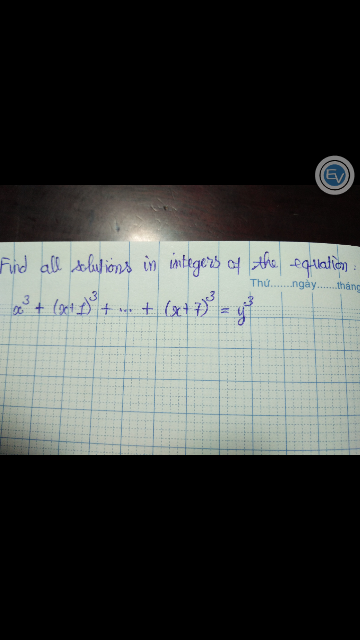
Question and Answers Forum
Number TheoryQuestion and Answers: Page 22



|
Question and Answers Forum |
Number TheoryQuestion and Answers: Page 22 |
| Let R be a cummutative ring with 1. and a,b member of R. Suppose a is invertible and b is nilpotent. Show that a + b is invertible. |
| Let R be a cummutative ring with 1, and a,b∈R. suppose a is ivertible and b is nilpotent. Show that a + b is ivertible. |
| find the fifth digit from the end of the number 5^5^5^4^5 |
| For all n ≥ 1 , n ∈ Z, prove that, p(n) : 4 + 8 + ... + 4n = 2n(n + 1) |

|
| Solve by mathematical induction that 1 + (1/(1 + 2)) + (1/(1 + 2 + 3)) + ... + (1/(1 + 2 + 3 + ... + n)) = ((2n)/(n + 1)) |
| Prove using the density of Q in R that every real number x is the limit of a cauchy sequence of rational numbers (r_n )_(n∈N) . Give a sequence of irrational numbers (S_n ) such that S_n → x. |
| 550÷11=50 And here 5^2 +5^2 +0^2 =50 find another three digit number which is divisible by 11 and the quotient is the sum of the square of the every digit of the dividend. / |
| What is the smallest positive integer x for which (1/(32)) = (x/(10^y )) for some positive integer y ? |
| ∅(n)=n−1 , n∈Z ,where ∅ is Eular phi function. True or false .And explain it . |
| How many solution {x, y, z} that fulfilled x + y + z = 99 ? x,y,z ∈ N |

|
| Let n be the smallest positive integer that is a multiple of 75 and has exactly 75 positive integral divisors, including 1 and itself. Find (n/(75)) |
| Which one is largest? (without using calculator) 31^(11) or 17^(14) ?? |
| Σ_(n = 1) ^∞ 5((1/4))^(n − 1) |
| Prove that: ζ(s)=Σ_(n=1) ^∞ n^(−s) =Π_(p∈P) ^∞ (1−p^(−s) )^(−1) |
| nth prime = p_n nth non−prime = q_n Determine if q_n >p_n for ∀n≥2 |
| S=Σ_(n∉P_(n≥1) ) ^∞ n Q=Σ_(n∈P_(n≥1) ) ^∞ n Prove if true: S>Q |
| determine if: (1/2^s )+(1/3^s )+(1/5^s )+...≥(1/1^s )+(1/4^s )+(1/6^s )+... or: Σ_(n∈P_(n≥1) ) ^∞ (1/n^s )≥Σ_(n∉P_(n≥1) ) ^∞ (1/n^s ), Re(s)>1 note: Σ_(n∈P_(n≥1) ) ^∞ (1/n^s )+Σ_(n∉P_(n≥1) ) ^∞ (1/n^s )=ζ(s) |
| 60^(15) ×30^8 ×35^6 ×60^(15) =? |
| 5^(71) +5^(72) +5^(73) =? |
| prove that (√(2 + ^3 (√(3 +...+ ^(1993) (√(1993)))))) <2 |
| 1+2+3+4+5+6+7+8+9+10+11 = x^y The sum of all possible solutions of x and y is ... |

|
| Find the sum of the digits of , 3333333334^2 |
| prove by mathematical induction n! ≤ n^n |